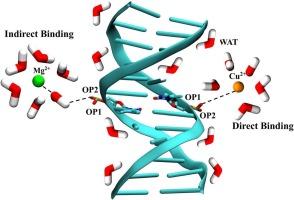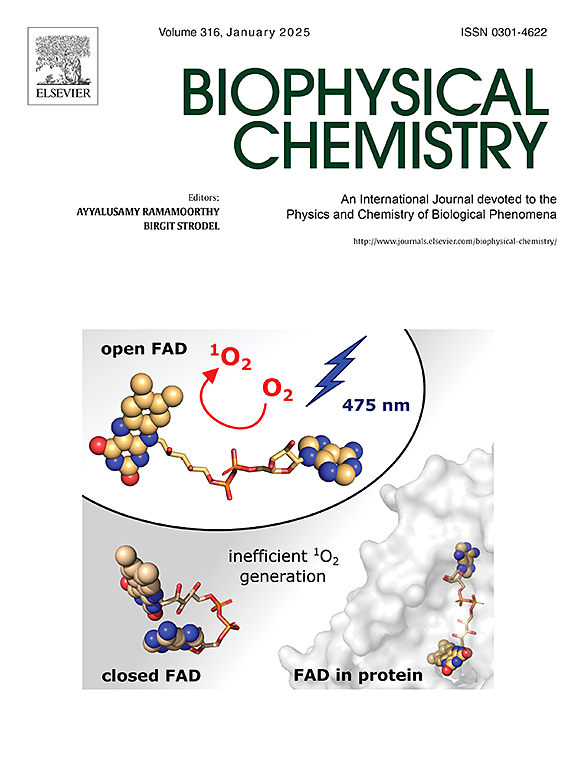Understanding Cu+2 binding with DNA: A molecular dynamics study comparing Cu2+ and Mg2+ binding to the Dickerson DNA
IF 3.3
3区 生物学
Q2 BIOCHEMISTRY & MOLECULAR BIOLOGY
引用次数: 0
Abstract
Cu2+ ions led DNA damage by reactive oxygen species (ROS) is widely known biological phenomena. The ionic radii of Cu2+ and Mg2+ being similar, the binding of Cu2+ ions to DNA is expected to be similar to that of the Mg2+ ions. However, little is known how Cu2+ ions bind in different parts (phosphate, major and minor grooves) of a double-strand (ds) DNA, especially at atomic level. In the present study, we employ molecular dynamic (MD) simulations to investigate the binding of Cu2+ ions with the Dickerson DNA, a B-type dodecamer double stranded (ds) DNA. The binding characteristics of Cu2+ and Mg2+ ions with this dsDNA are compared to get an insight into the differences and similarities in binding behavior of both ions. Unlike Mg2+ ions, the first hydration shell of Cu2+ is found to be labile, thus it shows both direct and indirect binding with the dsDNA, i.e., binding through displacement of water from the hydration shell or through the hydration shell. Though the binding propensity of Cu2+ ions with dsDNA is observed relatively stronger, the binding order to phosphates, major groove, and minor groove is found qualitatively similar (phosphates > major groove > minor groove) for both ions. The study gives a deep understanding of Cu2+ binding to DNA, which could be helpful in rationalizing the Cu2+ led ROS-mediated DNA damage.

了解 Cu+2 与 DNA 的结合:比较 Cu2+ 和 Mg2+ 与 Dickerson DNA 结合的分子动力学研究。
Cu2+ 离子导致活性氧(ROS)损伤 DNA 是广为人知的生物现象。Cu2+ 和 Mg2+ 的离子半径相似,因此 Cu2+ 离子与 DNA 的结合情况预计与 Mg2+ 离子相似。然而,人们对 Cu2+ 离子如何与双链(ds)DNA 的不同部分(磷酸、主要沟槽和次要沟槽)结合,尤其是在原子水平上结合知之甚少。在本研究中,我们采用分子动力学(MD)模拟来研究 Cu2+ 离子与 Dickerson DNA(一种 B 型十二聚体双链(ds)DNA)的结合。通过比较 Cu2+ 离子和 Mg2+ 离子与该 dsDNA 的结合特性,可以深入了解两种离子结合行为的异同。与 Mg2+ 离子不同,Cu2+ 离子的第一个水合壳是易变的,因此它与 dsDNA 的结合既有直接结合,也有间接结合,即通过水合壳中的水置换结合或通过水合壳结合。虽然观察到 Cu2+ 离子与 dsDNA 的结合倾向相对较强,但发现这两种离子与磷酸盐、主沟和小沟的结合顺序在性质上相似(磷酸盐 > 主沟 > 小沟)。该研究深入揭示了 Cu2+ 与 DNA 的结合,有助于合理解释 Cu2+ 导致的 ROS 介导的 DNA 损伤。
本文章由计算机程序翻译,如有差异,请以英文原文为准。
求助全文
约1分钟内获得全文
求助全文
来源期刊

Biophysical chemistry
生物-生化与分子生物学
CiteScore
6.10
自引率
10.50%
发文量
121
审稿时长
20 days
期刊介绍:
Biophysical Chemistry publishes original work and reviews in the areas of chemistry and physics directly impacting biological phenomena. Quantitative analysis of the properties of biological macromolecules, biologically active molecules, macromolecular assemblies and cell components in terms of kinetics, thermodynamics, spatio-temporal organization, NMR and X-ray structural biology, as well as single-molecule detection represent a major focus of the journal. Theoretical and computational treatments of biomacromolecular systems, macromolecular interactions, regulatory control and systems biology are also of interest to the journal.
 求助内容:
求助内容: 应助结果提醒方式:
应助结果提醒方式:


